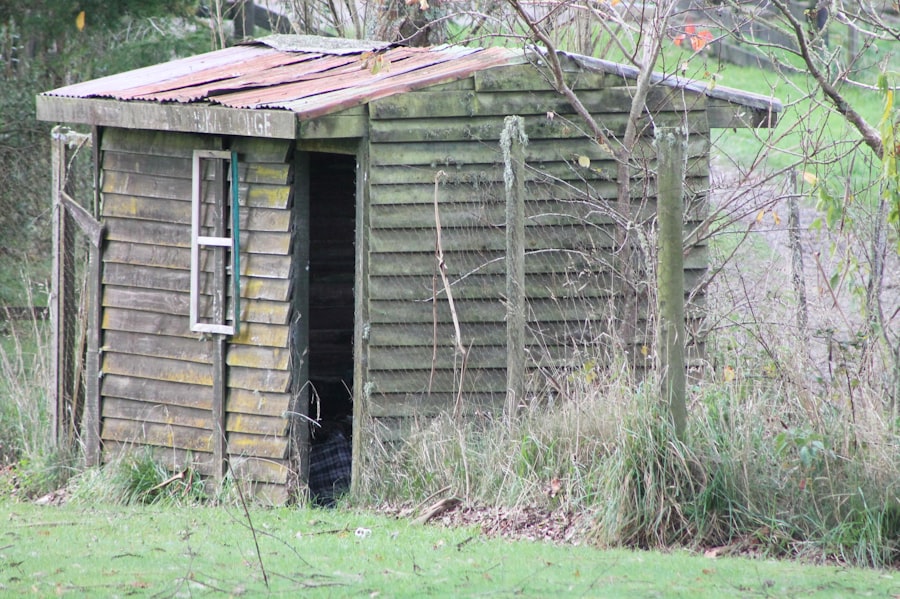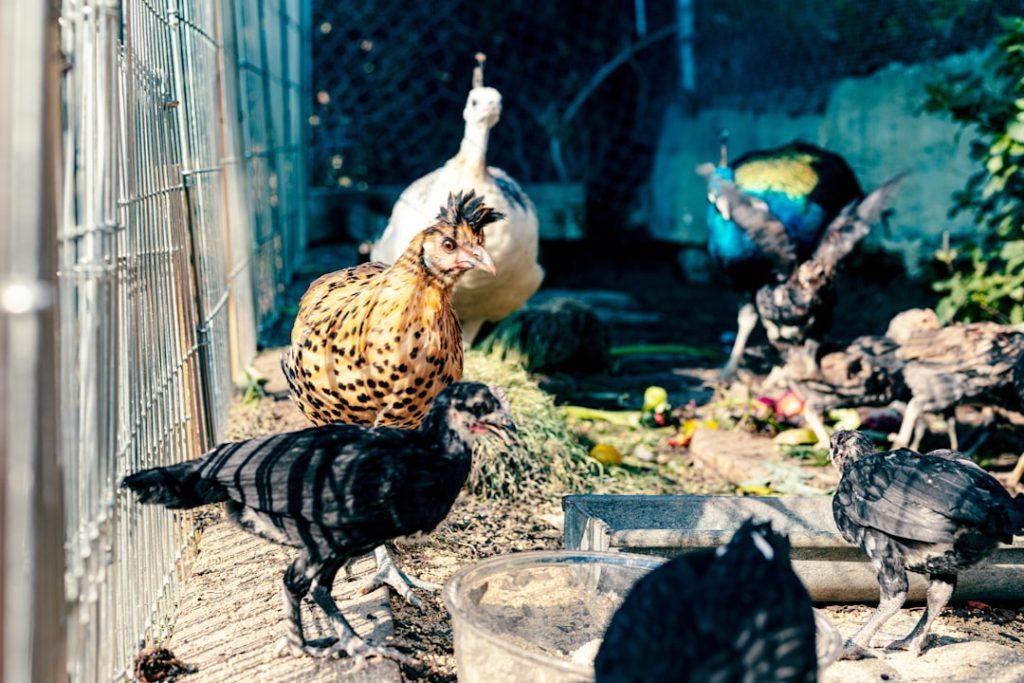When preparing a chicken coop, several factors must be considered to ensure the health and well-being of the birds. The coop should provide 2-3 square feet of space per chicken to allow for comfortable movement. Proper ventilation is crucial to prevent the accumulation of harmful ammonia from droppings.
Roosting bars and nesting boxes lined with clean bedding, such as straw or wood shavings, are essential components of the coop. Maintaining cleanliness is vital for preventing the spread of bacteria and parasites. Regular removal of droppings and soiled bedding is necessary.
Routine inspections for pests like mites, lice, and rodents should be conducted, with appropriate measures taken to eliminate them if found. Adequate lighting, either natural or artificial, is important for consistent egg production. A well-prepared chicken coop creates a comfortable, hygienic, and secure environment that promotes the health and productivity of the flock.
By addressing these key aspects, chicken owners can ensure optimal conditions for their birds.
Table of Contents
- 1 Providing Adequate Nutrition
- 2 Ensuring Proper Ventilation
- 3 Protecting Against Predators
- 4 Providing Warmth and Insulation
- 5 Managing Water Sources
- 6 Monitoring Health and Well-being
- 7 FAQs
- 7.1 What are the key considerations for keeping chickens through the winter?
- 7.2 How can I prepare the chicken coop for winter?
- 7.3 What should I feed my chickens during the winter?
- 7.4 How can I prevent water from freezing in the winter?
- 7.5 What are some common health issues for chickens in the winter?
Key Takeaways
- Clean the coop regularly to prevent the buildup of bacteria and parasites
- Provide a balanced diet with access to fresh water and appropriate supplements
- Ensure good air circulation to prevent respiratory issues
- Use secure fencing and locks to keep predators out of the coop
- Use insulation and heat lamps to keep the coop warm in colder months
- Keep water sources clean and easily accessible for the chickens
- Regularly check for signs of illness and provide necessary care for the chickens’ well-being
Providing Adequate Nutrition
Foundation of a Balanced Diet
A good quality commercial chicken feed is a great foundation for their diet, as it provides a balanced mix of protein, carbohydrates, vitamins, and minerals.
Essential Supplements
In addition to commercial feed, it’s also important to provide access to essential supplements like grit, which helps chickens grind up their food in their gizzards, as well as oyster shell or another source of calcium to support eggshell production in laying hens.
Healthy Treats in Moderation
Chickens can also benefit from supplemental treats such as fruits, vegetables, and grains. These treats can provide additional nutrients and variety in their diet, but it’s important to offer them in moderation to prevent nutritional imbalances. Fresh water should always be available to prevent dehydration.
Ensuring Proper Ventilation

Proper ventilation is crucial for maintaining a healthy environment inside the chicken coop. Good ventilation helps remove excess moisture, ammonia, and airborne pathogens from the air, which can otherwise lead to respiratory issues and other health problems for the chickens. Adequate ventilation also helps regulate temperature inside the coop, preventing it from becoming too hot or too cold.
There are several ways to ensure proper ventilation in the chicken coop. This can include installing windows or vents that can be opened and closed as needed to allow fresh air to circulate. It’s important to position these openings so that they allow for cross-ventilation without creating drafts that could chill the chickens.
Additionally, it’s important to regularly clean out bedding and droppings from the coop, as these can contribute to poor air quality if left to accumulate. Overall, ensuring proper ventilation in the chicken coop involves creating a well-ventilated space that allows for good air circulation without creating drafts or exposing the chickens to extreme temperatures.
Protecting Against Predators
Protecting your chickens from predators is essential for their safety and well-being. Common predators such as foxes, raccoons, hawks, and snakes can pose a threat to chickens, so it’s important to take measures to keep them out of the coop and run. This can include installing sturdy fencing around the perimeter of the coop and run, as well as burying wire mesh underground to prevent predators from digging underneath.
Additionally, it’s important to secure all openings in the coop, such as doors and windows, with strong locks or latches to prevent predators from gaining access. It’s also important to regularly inspect the coop for any signs of damage or wear that could create vulnerabilities for predators to exploit. Finally, providing a safe and secure roosting area inside the coop will help protect the chickens from nocturnal predators such as raccoons and owls.
Overall, protecting against predators involves creating a secure and fortified space for your chickens that will keep them safe from potential threats.
Providing Warmth and Insulation
Chickens are generally hardy birds that can tolerate a wide range of temperatures, but it’s still important to provide them with warmth and insulation during colder months. This is especially important for young chicks and older hens, which may be more susceptible to cold temperatures. Providing adequate warmth can be achieved by insulating the coop with materials such as straw or wood shavings, which can help retain heat inside the coop.
Additionally, providing a heat source such as a heat lamp or heated pad can help keep the coop at a comfortable temperature during colder weather. It’s important to position these heat sources carefully to prevent fire hazards and ensure that they are out of reach of the chickens. It’s also important to provide adequate ventilation in the coop even during colder months, as poor air quality can be a greater threat to chickens than cold temperatures.
Overall, providing warmth and insulation for your chickens involves creating a cozy and well-insulated space that will keep them comfortable and healthy during colder months.
Managing Water Sources

Drinking Water Essentials
In addition to providing clean water for drinking, it’s also important to consider water sources for bathing and dust bathing. Chickens enjoy bathing in water or dust to keep their feathers clean and free of parasites, so providing access to a shallow pan of water or a dust bathing area can help keep them healthy and comfortable.
Water Management During Colder Months
It’s also important to consider water management during colder months when water sources may freeze over. Providing heated waterers or regularly checking and replacing frozen water sources will ensure that your chickens have access to water at all times.
Overall Water Management
Overall, managing water sources for your chickens involves providing clean drinking water as well as opportunities for bathing and dust bathing to keep them healthy and comfortable.
Monitoring Health and Well-being
Regularly monitoring the health and well-being of your chickens is essential for catching any potential issues early and ensuring that they receive prompt care. This can include observing their behavior and appearance on a daily basis to look for any signs of illness or injury. Common signs of illness in chickens can include lethargy, decreased appetite, abnormal droppings, respiratory issues, or changes in behavior.
In addition to visual observation, it’s important to handle your chickens regularly to check for any abnormalities such as lumps or injuries on their bodies. Regularly checking their feet for signs of bumblefoot or other foot issues is also important for maintaining their overall health. Finally, it’s important to establish a relationship with a veterinarian who specializes in poultry care so that you have a resource for seeking professional advice and treatment if needed.
Overall, monitoring the health and well-being of your chickens involves regular observation and handling to ensure that they are healthy and thriving in their environment.
If you’re looking for more information on how to keep ducks, you might find this article on what to feed ducks helpful. It’s important to ensure that your ducks are getting the proper nutrition, especially during the winter months.
FAQs
What are the key considerations for keeping chickens through the winter?
– Providing adequate shelter to protect chickens from cold temperatures and drafts
– Ensuring access to fresh water that doesn’t freeze
– Offering a balanced diet to help chickens maintain their body heat
– Monitoring for signs of illness or distress due to the cold
How can I prepare the chicken coop for winter?
– Insulate the coop to help retain heat
– Seal any drafts or gaps in the coop
– Use deep bedding to provide insulation and warmth
– Install a safe heat source, if necessary, to keep the coop above freezing temperatures
What should I feed my chickens during the winter?
– Provide a balanced diet that includes a mix of grains, protein, and fresh greens
– Consider increasing the protein content to help chickens stay warm
– Offer additional treats and supplements to help maintain energy levels
How can I prevent water from freezing in the winter?
– Use heated waterers or heated bases to prevent water from freezing
– Check water sources frequently and break up any ice that forms
– Consider using insulated water containers to help maintain temperature
What are some common health issues for chickens in the winter?
– Frostbite on combs, wattles, and feet
– Respiratory issues due to poor ventilation or damp conditions
– Reduced egg production due to decreased daylight hours and cold temperatures
Meet Walter, the feathered-friend fanatic of Florida! Nestled in the sunshine state, Walter struts through life with his feathered companions, clucking his way to happiness. With a coop that’s fancier than a five-star hotel, he’s the Don Juan of the chicken world. When he’s not teaching his hens to do the cha-cha, you’ll find him in a heated debate with his prized rooster, Sir Clucks-a-Lot. Walter’s poultry passion is no yolk; he’s the sunny-side-up guy you never knew you needed in your flock of friends!







